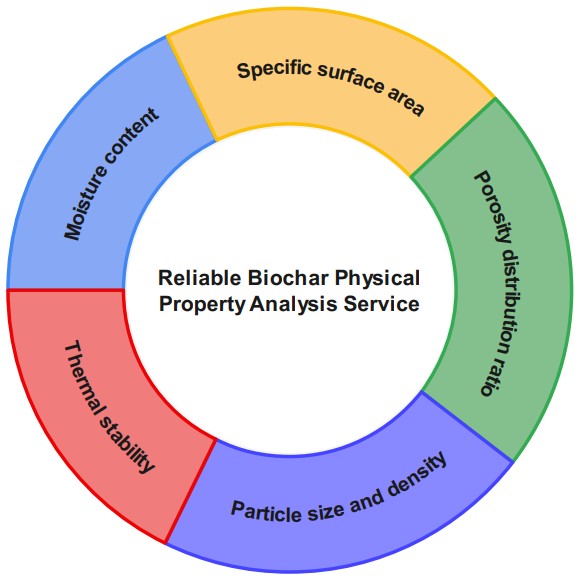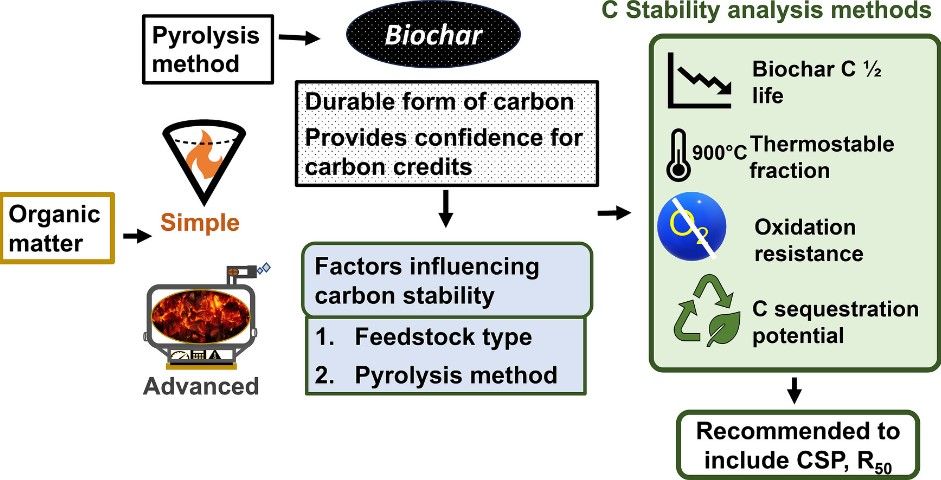Biochar Physical Property Characterization Service
Reliable Biochar Physical Property Analysis Service at Creative Biolabs
Biochar is a carbonaceous solid made from biomass by pyrolysis or gasification, with unique pore structure and surface properties. The importance of characterizing the physical properties of biochar lies in being able to fully understand its key parameters such as structural characteristics, pore distribution, and specific surface area. These physical properties directly affect the application effect and performance of biochar in the fields of soil improvement, pollution remediation, and water resource management. Creative Biolabs has a professional analysis team and many years of analysis experience, and we accurately and comprehensively characterize the physical properties of biochar. By characterizing the physical properties of biochar, its performance is optimized and product quality is controlled, thereby promoting the development and widespread application of biochar technology.
We use nitrogen adsorption-desorption technology (BET method) to determine the specific surface area of biochar. First, we use the BET method to determine the amount of nitrogen adsorbed by biochar samples at different relative pressures; then we draw nitrogen adsorption isotherms according to these data and calculate the specific surface area of biochar. This process helps clients fully understand the pore structure characteristics of biochar, evaluate its adsorption performance and application potential, and provide an important reference for the practical application of biochar in the fields of soil improvement, water resource management, etc.
-
Porosity distribution ratio
We obtain a series of adsorption isotherm data through the BET method. Using this data, we calculate the pore distribution map of biochar and derive the pore size distribution curve, which shows the existence of pores of various sizes. By drawing and interpreting these pore distribution data, clients have a deep understanding of the pore structure characteristics, pore size range, and distribution of biochar, to provide clients with targeted guidance and suggestions.
-
Particle size and density analysis
We use a particle size analyzer or microscope to measure the size distribution and morphological characteristics of biochar particles to determine their particle size range; then we use the bulk density method to measure the bulk density and density of biochar, and then calculate the porosity information. These analysis results help clients understand the morphological characteristics, density, and pore structure of biochar particles, and provide important reference for the selection and optimization of biochar in practical applications.
We use a thermogravimetric analyzer to measure the thermal stability of biochar. The thermogravimetric analyzer heats the biochar sample under the condition of controlling the heating rate, recording its mass change under high-temperature conditions, and thus evaluating the thermal stability performance of biochar under a high-temperature environment. This analysis helps clients understand the pyrolysis characteristics, thermal stability, and suitability of biochar in high-temperature applications and provides an important reference for the evaluation of biochar in areas such as energy utilization.
In addition, we also determine the moisture content of biochar by gravimetric or titration to evaluate the effect of its moisture content on physical properties.

Creative Biolabs is equipped with advanced experimental equipment and technology to accurately measure and analyze the physical property indicators of biochar, such as specific surface area and pore structure. We have a flexible service model and provide custom physical property characterization solutions according to client needs to meet the needs of different industries and application fields. In addition, we also provide Biochar Manufacturing, Thermal Property, and Soil Amendment Property Analysis services. Please contact us for more details if you would like to consult our detailed service.
Published data
Reducing greenhouse gas emissions is an important strategy to address global warming. As an emerging negative emission technology, biochar could remove additional carbon dioxide from the atmosphere. Biochar can be sustainably obtained from residual biomass and has significant carbon sequestration potential. Its improved pore structure and large surface area can capture carbon and reduce greenhouse gases in the soil for a long time. Therefore, it is regarded as an economical and easy-to-promote solution to climate change. The thermochemical carbon stability of biochar is a key indicator for evaluating the overall greenhouse gas emission reduction effect. In this study, the authors used a variety of instrumental analysis methods (such as elemental analysis, X-ray diffraction analysis, etc.) combined with carbon stability indicators to systematically evaluate the stability of 21 biochar samples from different raw materials and pyrolysis technologies, and investigated the antioxidant capacity, carbon structure stability and persistence of these biochars. The results showed that the type of raw material affected the carbon stability of biochar products. Among them, the carbon stability of biochar produced from grass and woody biomass was much higher than that of biochar produced from sewage sludge biomass. In addition, there was no significant difference in stability between biochar prepared by simple pyrolysis and advanced pyrolysis.
 Fig.1 Biochar stability assessment scheme.1, 2
Fig.1 Biochar stability assessment scheme.1, 2
FAQs
Q1: Why do we need to analyze the physical properties of biochar?
A1: Physical property analysis helps clients understand key parameters of biochar, such as pore structure, specific surface area, adsorption capacity, etc., to select the right biochar product for specific applications.
Q2: How does the pore structure of biochar affect its performance?
A2: Different types of pore structures will affect the gas adsorption, ion exchange, and other functions of biochar. Our physical property analysis will help clients understand the pore structure characteristics of biochar.
Q3: What information does your physical property analysis service report contain?
A3: Our reports usually include detailed information such as pore structure analysis diagrams, specific surface area data, density measurement results, particle size distribution, etc., to help clients fully understand the physical properties of biochar.
Customer Review
Guide Clients to Select Biochar Products That Meet Project Requirements
"The biochar physical properties analysis service provided by Creative Biolabs is very professional. The analysis results helped us better choose the products suitable for our project, and the effect was remarkable! I highly recommend the services of the Creative Biolabs team!"
Detailed Biochar Physical Property Analysis Report
"Thank you Creative Biolabs for providing us with a detailed biochar physical properties analysis report, which was very helpful for us to choose the right product! The professional and reliable team is trustworthy!"
References
-
Adhikari, Sirjana, et al. "Comparative analysis of biochar carbon stability methods and implications for carbon credits." Science of the Total Environment 914 (2024): 169607.
-
Under Open Access license CC BY 4.0, without modification.
For Research Use Only.
Related Services


 Fig.1 Biochar stability assessment scheme.1, 2
Fig.1 Biochar stability assessment scheme.1, 2

